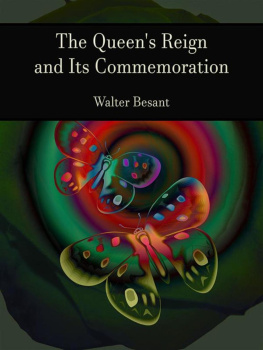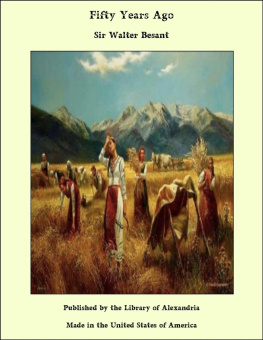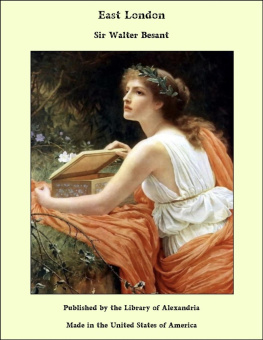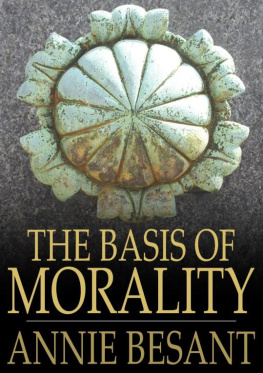Headpiece: Heralds blowing horns
Headpiece: Heralds blowing horns
Introduction
Though I look old, yet I am strong and lusty.
As You Like It.
W
When Sydney Smith, towards the close of his life, considered the changes which had passed over the country within his recollection, he said that he wondered how the young men of his time had managed to preserve even a decent appearance of cheerfulness. Sydney Smith died in 1845, just at the beginning of those deeper and wider changes of which he suspected nothing; for, though he was a clear-headed man in many ways, he was no prophethe saw the actual and the present, but was unable to feel the action of the invisible and potent forces which were creating a future to him terrible and almost impossible. Had he possessed the prophetic spirit, he would have been another Jeremiah for the destruction of the old forms of society; the levelling up and the levelling down destined to take place would have been pain and grief intolerable to him.
I have always maintained that the eighteenth century lingered on in its ways, customs, and modes of thought until the commencement of Queen Victorias reign, and I regard myself with a certain complacency as having been born on the fringe of that interesting period. I might also take pleasure in remembering that one who has lived through this reign has been an eyewitness, a bystander, perhaps in some minute degree an assistant, during a Revolution which has transformed this country completely from every point of view, not only in manners and customs, but also in thought, in ideas, in standards; in the way of regarding this world, and in the way of considering the world to come. I do not, however, take much pleasure in this retrospect, because the transition has taken place silently, without my knowledge; it escaped my notice while it went on: the world has changed before my eyes, and I have not regarded the phenomenon, being busily occupied over my own little individual interests. I have been, indeed, like one who sits in a garden thinking and weaving stories, nor heeding while the shadows shift slowly across the lawns, while the hand of the dial moves on from morning to afternoon. I have been like such a one, and, like him, I have awakened to find that the air, the light, the sky, the sunshine have all changed, and that the day is well-nigh done.
Do not expect in this volume a Life of Queen Victoria. You have her public life in the events of her reign: of her private life I will speak in the next chapter. But I can offer you no special, otherwise unattainable, information; there will be here no scandal of the Court; I have climbed no backstairs; I have peeped through no key-hole; I have perused no secret correspondence; I have, on this subject, nothing to tell you but what you know already.
Do not again look in these pages for a rsum of public events. You may find them in any Annual or Encyclopdia. What I propose to show you is the transformation of the people by the continual pressure and influence of legislation and of events of which no one suspected the far-reaching action. The greatest importance of public events is often seen, after the lapse of years, in their effect upon the character of the people: this view of the case, this transforming force of any new measure, seldom considered by statesman or by philosopher, because neither one nor the other has the prophetic giftif it could be adequately considered while that measure is under discussionwould be stronger than any possible persuasion or any arguments of expediency, logic, or abstract justice.
I propose, therefore, to present a picture of the various social strata in 1837, and to show how the remarkable acts of British Legislation, such as Free Trade, cheap newspapers, improved communications, together with such accidents as the discovery of gold in Australia, and of diamonds at the Cape, have altogether, one with the other, so completely changed the mind and the habits of the ordinary Englishman that he would not, could he see him, recognise his own grandfather. And I hope that this sketch may prove not only useful in the manner already indicated, but also interesting and fresh to the general readers.
W. B.
Easter Sunday , 18th April 1897.
Tailpiece
CHAPTER I
QUEEN AND CONSTITUTION
The wise woman buildeth her house.Book of Proverbs.
I
In 1837 the Queen mounted the throne. It was a time of misgiving and of discontent. The passing of the Reform Act of 1832 had not as yet produced the results expected of it; there were other and more sweeping reforms in the air: the misery and the oppression of the factory hands, the incredible cruelty practised on the children of the mill and the mine, the deep poverty of the agricultural districts, the distress of the trading classes, formed a gloomy portal to a reign which was destined to be so long and so glorious. Thus, in turning over the papers then circulated among the working-classes of the time, one observes a total absence of anything like loyalty to the Crown. It has vanished. A blind hatred has taken its place. What is loyalty to the Crown? To begin with, it is something more than an intelligent adhesion to the Constitution; it regards the Sovereign as personifying and representing the nation; it ascribes to the Sovereign, therefore, the highest virtues and qualities which the nation itself would present to the world. The King, among loyal people, is brave, honest, truthful, the chief support of the Constitution, the Fountain of Honour. To obey the King is to obey the country. To die for the King is to die for the country. The Army and the Navy are the Kings Army and Navy. The King grants commissions; the King is supposed to direct military operations. The King is the First Gentleman in his country. When one reads the words which used to be addressed to such a man as Charles the Second one has to remember these things. Charles the Second, unworthy as he was in his private life, was still the representative of the nation. Therefore, to ascribe to that unworthy person these virtues which were so notoriously lacking was no more than a recognition of the fact that he was King. Has, then, personal character, private honour, truth, principle, nothing to do with kingcraft? Formerly, nothing or next to nothing. Now, everything. Another George the Fourth would now be impossible. But he has been made impossible by the private character of his niece.
Consider a little further the question of loyalty. I say that in 1837 among the mass of the people, even among the better class, there was none. Indeed the loyalty of the better sort had suffered for more than a hundred years many grievous knocks and discouragements. The first two Georges, good and great in official language, were aliens; they spoke a foreign tongue; they saw little of the people; yet they were tolerated, and even popular in a way, because they steadfastly upheld the Constitution and the Protestant religion. The third George began well; he was a Prince always of high moral character, strong principle, and great sincerity. Since Edward the Confessor or Henry the Sixth there had been no Sovereign so virtuous. But his constant endeavours to extend the Royal Prerogative, his obstinate treatment of the American Provinces against the impassioned and reiterated entreaties of Chatham, Burke, and the City of London, his stubborn refusal to hear of Parliamentary Reform, his desire to govern by a few families, his long affliction and seclusion, destroyed most of the personal affection with which he began. His successor, the hero of a thousand caricatures, a discredited voluptuary, never commanded the least respect except in official addresses; nor did William the Fourth, old, without force or character, without dignity. Wherefore, in 1837, when the cry of Our Young Queen was raised, it met with little response from the great mass of the people.










